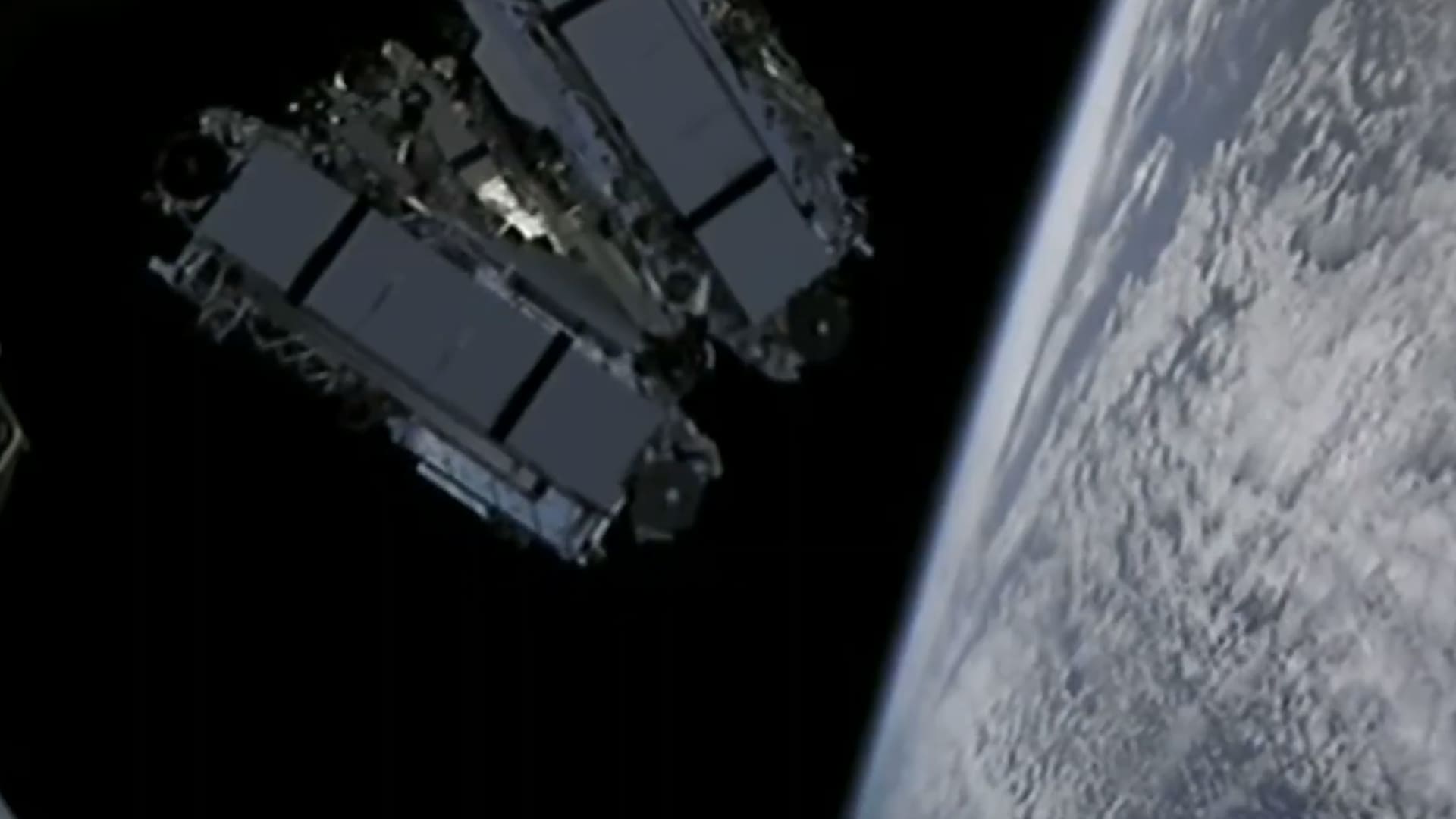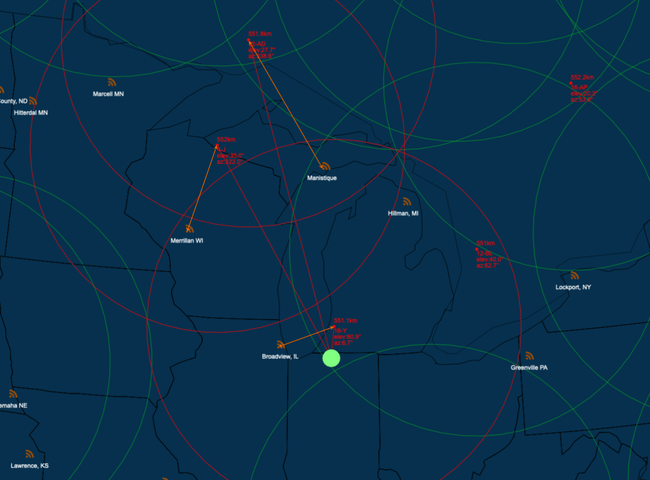In case you've been hiding in a cave, HughesNet has a major promotional push. Why do suppose they would be doing that right now when SpaceX/Starlink is getting the headlines in tech?Only if he has new satellites on order
DISH wants Starlink to Cease Operations
- Thread starter Scott Greczkowski
- Start date
- Latest activity Latest activity:
- Replies 69
- Views 13K
You are using an out of date browser. It may not display this or other websites correctly.
You should upgrade or use an alternative browser.
You should upgrade or use an alternative browser.
My question was answered..perhaps you should have scrolled down firstIn case you've been hiding in a cave, HughesNet has a major promotional push. Why do suppose they would be doing that right now when SpaceX/Starlink is getting the headlines in tech?
I did scroll down, but you made statement, not a question. HughesNet has no new satellites on order at this time. As said, they do have a new one in the sky under test, but that's not what your post referred to.My question was answered..perhaps you should have scrolled down first
You better reread the responsesI did scroll down, but you made statement, not a question. HughesNet has no new satellites on order at this time. As said, they do have a new one in the sky under test, but that's not what your post referred to.
You better reread the responses

HughesNet® Planning To Introduce 100 Mbps Satellite In 2021
HughesNet® is planning to improve their best internet service with the launch of a new satellite in 2021. This will make their best internet service better…
 www.thetripleplay.net
www.thetripleplay.net
PLEASE LOG IN TO GET RID OF THESE ADS!
Charlie wants the subsidies

SpaceX's Starlink wins nearly $900 million in FCC subsidies to bring internet to rural areas
The FCC awarded Elon Musk's SpaceX with nearly $900 million worth of federal subsidies to support rural customers with its Starlink satellite internet networkwww.cnbc.com
Yeah just like they got the recovery act funds about 10 years ago.
That was a joke, money should have went to traditional wired internet providers or local wireless providers.
Satellite internet providers should have never gotten the money
Sent from my iPhone using Tapatalk

HughesNet® Planning To Introduce 100 Mbps Satellite In 2021
HughesNet® is planning to improve their best internet service with the launch of a new satellite in 2021. This will make their best internet service better…www.thetripleplay.net
25 megs, 100, or a full gig. Makes no difference. The service will still suck as long as they have the latency issue and Data caps.
Sent from my iPhone using Tapatalk
Why? Land based "providers" haven't exactly done a bang up job. And satellite will actually provide the service. What difference does it make if the signal comes from the sky, or from a cable or fiber with backhoe issues?Yeah just like they got the recovery act funds about 10 years ago.
That was a joke, money should have went to traditional wired internet providers or local wireless providers.
Satellite internet providers should have never gotten the money
Sent from my iPhone using Tapatalk
A heck of a lot if latency is important to youWhy? Land based "providers" haven't exactly done a bang up job. And satellite will actually provide the service. What difference does it make if the signal comes from the sky, or from a cable or fiber with backhoe issues?
I am curious. I can see if you are an avid gamer, it would matter. It might also matter if you use VoIP. But everything else?A heck of a lot if latency is important to you
PLEASE LOG IN TO GET RID OF THESE ADS!
100% agree25 megs, 100, or a full gig. Makes no difference. The service will still suck as long as they have the latency issue and Data caps.
Sent from my iPhone using Tapatalk
Live video also suffers from latencyI am curious. I can see if you are an avid gamer, it would matter. It might also matter if you use VoIP. But everything else?
Those would be the things I can think of, too, but gaming isn't just a niche industry.I am curious. I can see if you are an avid gamer, it would matter. It might also matter if you use VoIP. But everything else?
Starlink has low latency.A heck of a lot if latency is important to you
Yeah, much lower than Hughes or Viasat, for sure, but serious gamers are looking for the lowest ping possible. The one game I play the most, an FPS game, my latency with my ISP is 1, my ping on a US server in NY is 45 and in the UK is about 120. in the NL it's about 145 - which makes the game noticeably different and harder to hit targets and escape enemies.Starlink has low latency.
I'm not sure what Starlink is touting, but Hughes and Viasat are in the high 600's, which is what makes it impossible for gamers.
PLEASE LOG IN TO GET RID OF THESE ADS!
Post #14. And probably much better now since Elon spewed out a bunch more sats.Yeah, much lower than Hughes or Viasat, for sure, but serious gamers are looking for the lowest ping possible. The one game I play the most, an FPS game, my latency with my ISP is 1, my ping on a US server in NY is 45 and in the UK is about 120. in the NL it's about 145 - which makes the game noticeably different and harder to hit targets and escape enemies.
I'm not sure what Starlink is touting, but Hughes and Viasat are in the high 600's, which is what makes it impossible for gamers.
Keep in mind that Starlink is still very much in beta, so temper your expectations a bit until the service settles down and matures a little longer. Starlink users on Reddit are reporting mixed gaming results, pretty much in the "When it's good, it's very good, but when it's bad..." category.
Same distancePost #14. And probably much better now since Elon spewed out a bunch more sats.
I was about to say the same thing. But then I noticed that arlo was talking about bandwidth and not latency.Same distance
The latency of Starlink depends on many factors, mostly how close your terrestrial Starlink terminal is in relationship to the Starlink ground station. Where I am, the Starlink Ground Station would either be located in Broadville, IL, or Hillman, MI. So, the trip up to the Starlink satellite at 550 km altitude, back down to the Earth station, and from there it's just like any other Internet provider concerning latency.
So, assume 550 km up and 550 km away, that's roughly 778 km, or 777,817 meters. Light travels 300,000,000 m/s in a vacuum, so the travel time up and assuming a similar situation for the trip down, yields a little over 5 ms for the outbound leg, maybe adding 1 ms for internal processing time in the satellite. So, Starlink could add just under 15 ms to the "normal" terrestrial Internet travel time. My attached example doesn't attempt to figure out the actual distances involved at this moment in time where I had three possible paths to the Internet backbone. If I were attempting to connect to my work system, the additional travel would pretty much be the distance up (550 km), the distance down (550 km), and the backbone time from Broadville, IL to our Corporate datacenter near Chicago. But, that would be the best case, and it would probably jump up another 15 ms if my Starlink used the Wi or MI ground stations.
I would say it's not the latency that "kills" Starlink for time-sensitive protocols, but the jitter; the wide swings in latency from 15 additional milliseconds on up to 50-60 ms.
So, assume 550 km up and 550 km away, that's roughly 778 km, or 777,817 meters. Light travels 300,000,000 m/s in a vacuum, so the travel time up and assuming a similar situation for the trip down, yields a little over 5 ms for the outbound leg, maybe adding 1 ms for internal processing time in the satellite. So, Starlink could add just under 15 ms to the "normal" terrestrial Internet travel time. My attached example doesn't attempt to figure out the actual distances involved at this moment in time where I had three possible paths to the Internet backbone. If I were attempting to connect to my work system, the additional travel would pretty much be the distance up (550 km), the distance down (550 km), and the backbone time from Broadville, IL to our Corporate datacenter near Chicago. But, that would be the best case, and it would probably jump up another 15 ms if my Starlink used the Wi or MI ground stations.
I would say it's not the latency that "kills" Starlink for time-sensitive protocols, but the jitter; the wide swings in latency from 15 additional milliseconds on up to 50-60 ms.
PLEASE LOG IN TO GET RID OF THESE ADS!
Users Who Are Viewing This Thread (Total: 0, Members: 0, Guests: 0)
Who Read This Thread (Total Members: 1)
Latest posts
-
TThis Top App in China Checks In to Ask "Are You Dead?" #shorts
- Latest: TWiT Tech Podcast Network
-
L
-
-
-


